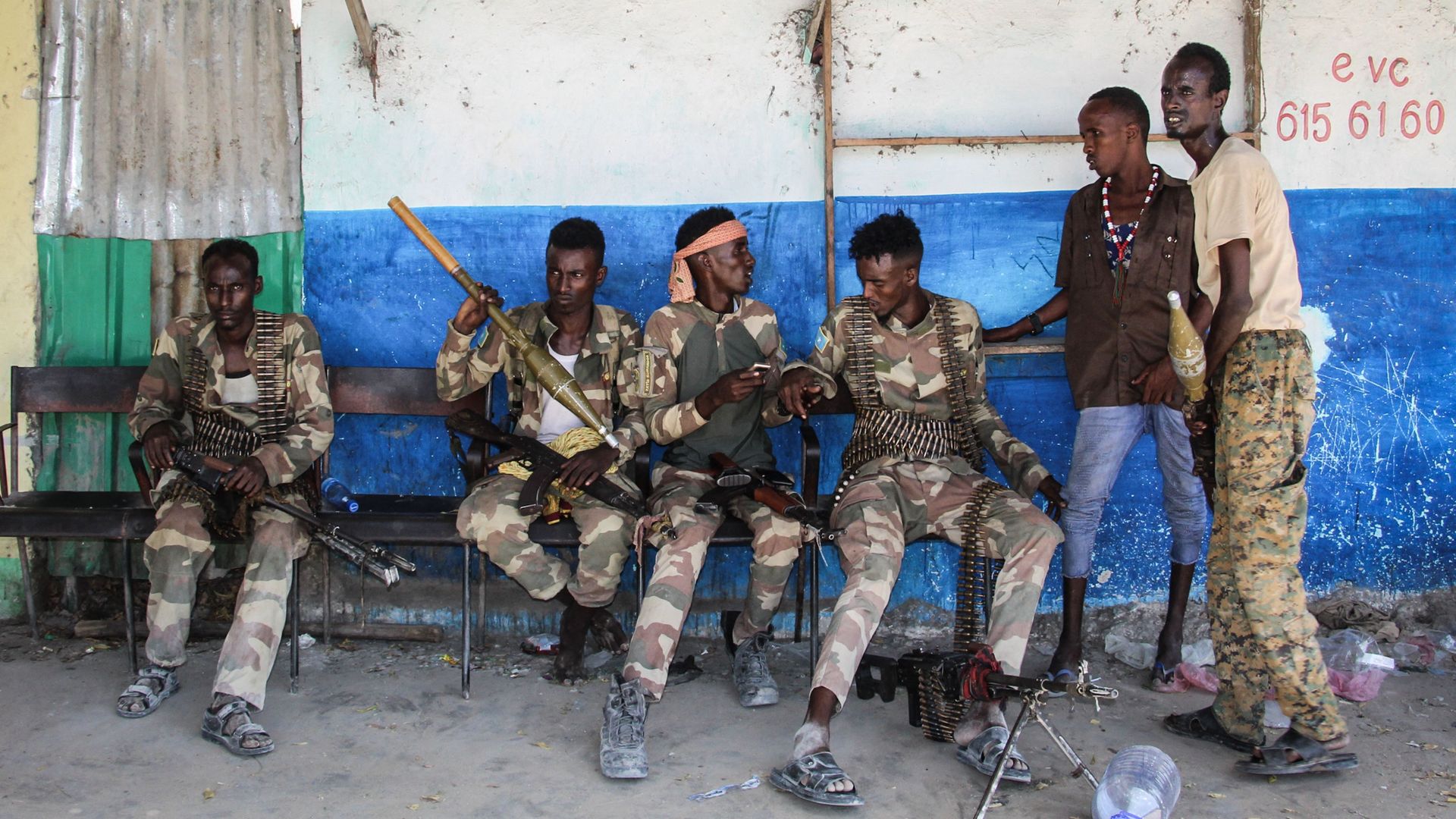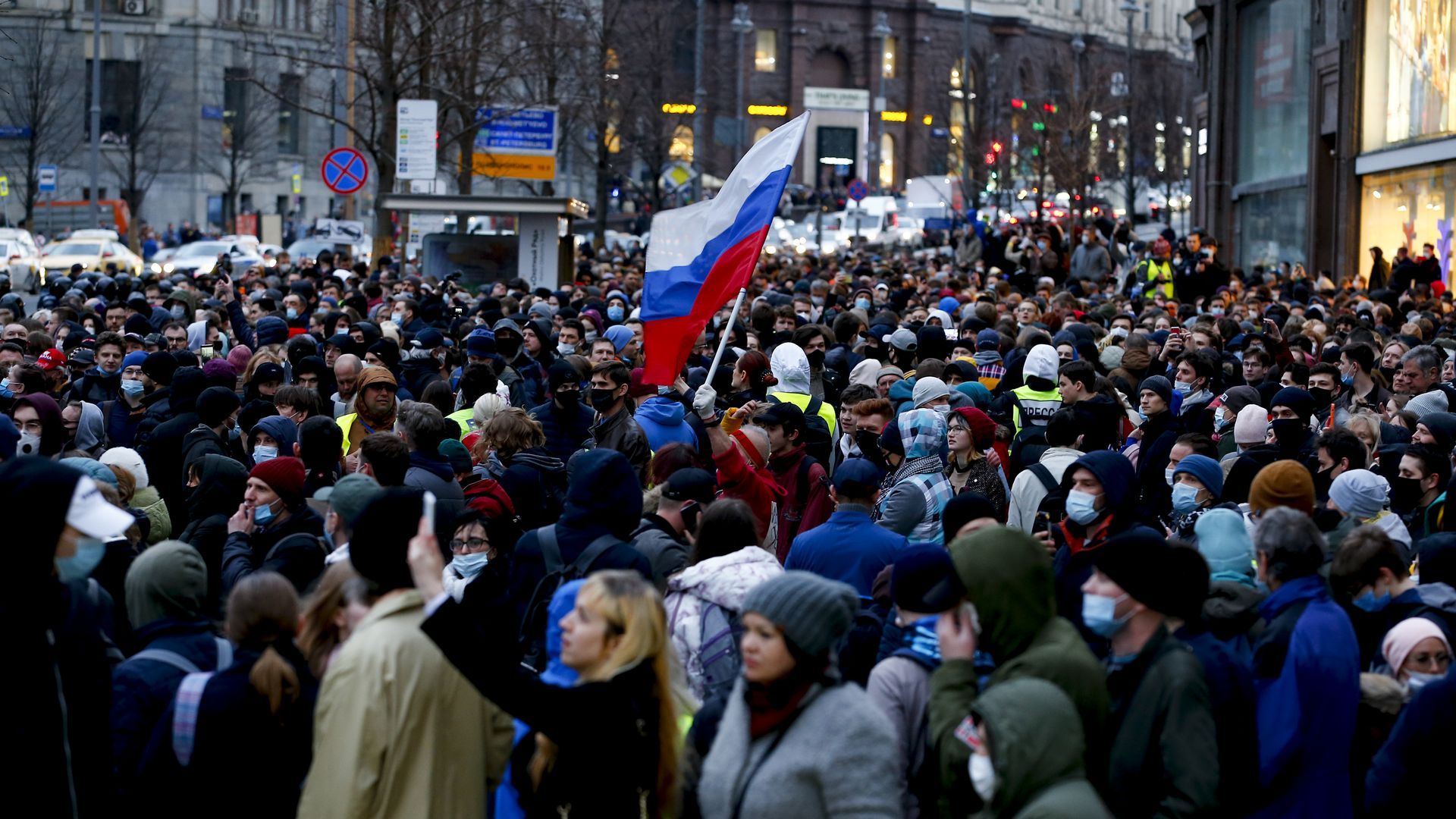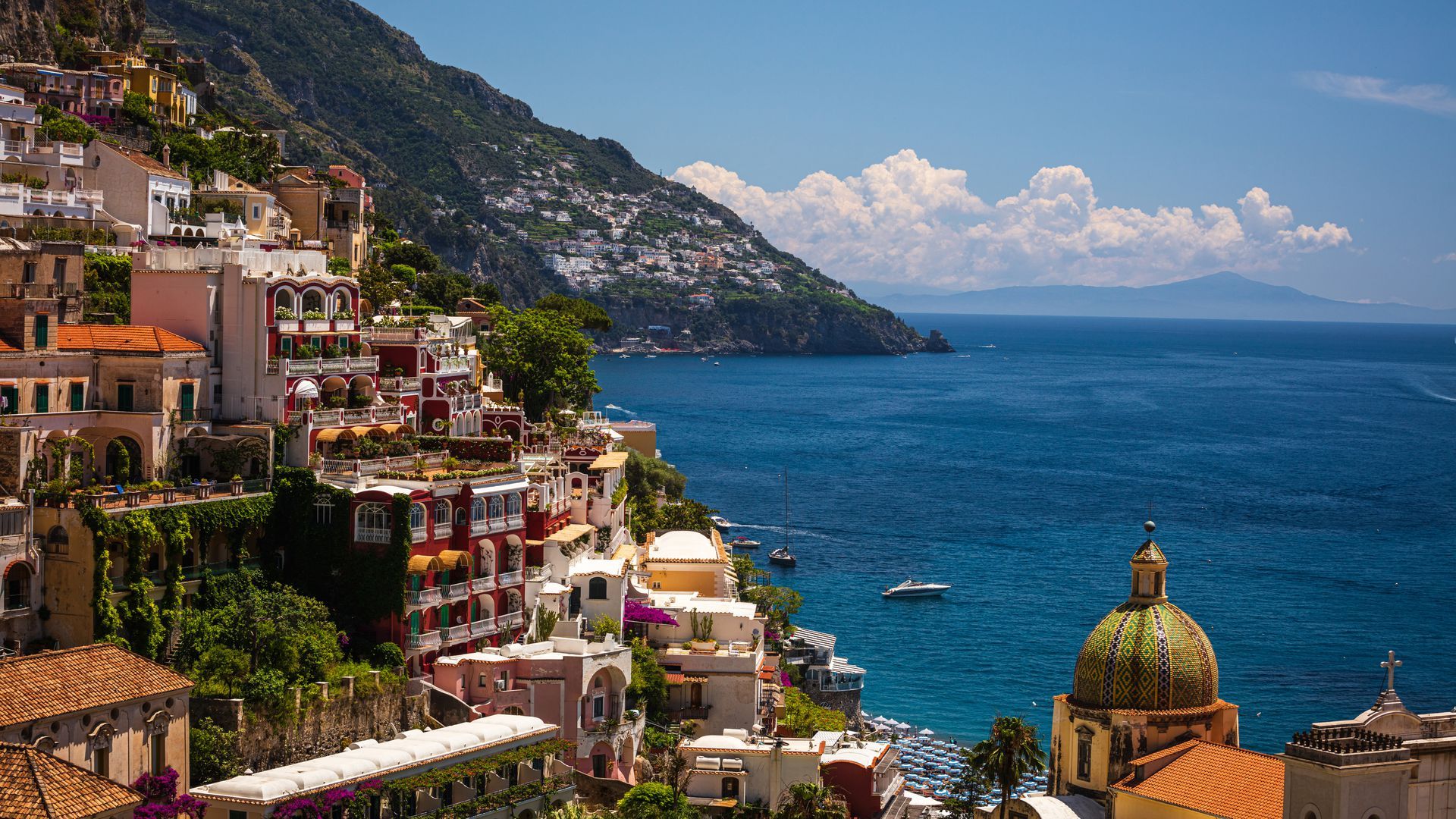| | | | | | | Presented By Blockchain.com | | | | Axios World | | By Dave Lawler ·Apr 26, 2021 | | Welcome back to Axios World. - In tonight's edition (1,679 words, 6 minutes) we're focusing on vaccines, making stops in Russia and Somalia, and heading on a European vacation.
- Thanks for reading. Feel free to reply to this email with thoughts on what you'd like to read.
New arrival? Sign up. | | | | | | 1 big thing: Biden gets a late start on vaccine sharing |  Data: Airfinity; Chart: Andrew Witherspoon/Axios The Biden administration took its biggest step yet toward becoming a global supplier of coronavirus vaccines, announcing that it would export 60 million AstraZeneca doses over the next several weeks. Why it matters: President Biden has been under intense global scrutiny for his "Americans first" approach. Alone among the four major producers, the U.S. has kept nearly its entire supply at home up to now. - The biggest symbol of Washington's "vaccine nationalism" had been the stockpiling of the AstraZeneca vaccine — not approved and not needed in the U.S., but crucial to many countries' rollouts.
- A senior administration official told reporters tonight that just 10 million doses were waiting to be distributed (much lower than had been reported), while another 50 million doses would be ready by June.
Those doses will be exported around the world, pending an FDA safety review, but the White House says no decisions have been made as to which countries will receive them. - India could be near the top of the list given the terrifying outbreak there, though the White House says Prime Minister Narendra Modi did not request doses in a call with Biden today.
- So too could Mexico, which has turned to Russia and China in search of vaccines despite bordering one of the world's largest producers.
Breaking it down: While relatively small compared to the 231 million doses the U.S. has already administered, 60 million doses would be a major boost to the severely strained global supply. - The COVAX initiative, the primary source of vaccines for dozens of lower-income countries, has thus far only distributed 45 million doses globally.
- Still, now that Biden has shown he's willing to export the vaccine the U.S. isn't using, the obvious next question is when he'll allow exports of the ones it is: Pfizer, Moderna and Johnson & Johnson.
What to watch: Nearly every U.S. adult who wants a vaccine will likely have had one within the next two to three weeks, Axios' Caitlin Owens reports. - And as demand begins to wane, supply should continue to ramp up. Pfizer, Moderna, J&J and AstraZeneca still owe the U.S. hundreds of millions of doses (more still if Biden exercises additional purchase options).
- Biden will face international pressure and public health imperatives to share those doses with the world. He has said that he hopes to do so once the U.S. has a "surplus" but offered no clarity as to what qualifies as a surplus or where the doses will go.
- On the one hand: The Biden administration has emphasized the need for caution and flexibility at home, citing possible production disruptions, the likely need for booster shots and the possibility of vaccinating children.
- On the other: Secretary of State Tony Blinken has said the U.S. will become "the world leader in helping to make sure that the entire world gets vaccinated."
The bottom line: Even as the U.S. puts billions of dollars toward that goal, it has been unwilling to tap the biggest asset at Biden's disposal: the doses streaming out of U.S. factories each week. |     | | | | | | 2. State of the outbreak: A billion doses, mainly for the rich |  Note: This map represents the total number of vaccines administered, not people vaccinated; Data: Our World in Data; Map: Danielle Alberti/Axios The world has now crossed 1 billion total vaccines administered. Breaking it down: Nearly half of those have come in the U.S. (29%), EU (13%) and U.K. (5%), with other rich countries also sprinting ahead. Another 22% have come in China and 14% in India. Africa, meanwhile, represents just 1.6% of vaccinations to date. One reason is that the COVAX initiative, designed to ensure that every country has access to vaccines, is just 16% of the way to its distribution target for the first half of 2021. - That's due in large part to the fact that India — by far the largest provider of COVAX doses — went from exporting 77% of its production before March 15 to 7% over the past month, per Airfinity. India has curbed exports to fight the surge at home.
- If India continues to keep nearly all of its production, Airfinity projects there would be enough supply to cover people over 60 by May and the entire adult population by November.
- But African CDC Director John Nkengasong and other public health officials have called on India to lift the export restrictions, noting that a prolonged delay could be catastrophic for countries that are counting on COVAX.
What to watch: The main issue facing COVAX right now isn't funding but securing reliable sources of vaccines. - It remains to be seen whether the U.S. will share its AstraZeneca doses through COVAX or bilateral arrangements with individual countries.
In other news: European Commission sues AstraZeneca for vaccine shortages |     | | | | | | Update: India's surge continues |  Data: CSSE Johns Hopkins University; Chart: Andrew Witherspoon/Axios The U.S., Germany, U.K. and even rival Pakistan have promised to rush oxygen and other supplies to India, which is facing one of the most terrifying surges seen anywhere in the world. - Without new government restrictions, India could see over 4.5 million cases per day by early May, factoring in the large number that are going unrecorded, according to a model from University of Michigan epidemiologist Bhramar Mukherjee.
Flashback: Modi and his Bharatiya Janata Party declared victory over the virus in January, and as recently as last month his health minister said the country was in the "endgame" of the pandemic. - The government has been accused of putting politics ahead of public health — including by pushing ahead with elections this month — and of failing to use the long lull to prepare the health system.
- Modi has acknowledged that India is in the midst of a "storm," but appealed for calm.
|     | | | | | | A message from Blockchain.com | | Worried you missed the boat on Bitcoin? It's not too late | | |  | | | | Blockchain.com allows you to buy, sell, trade, swap and earn cryptocurrencies like Bitcoin. The background: With over 70M Wallets in 200 countries, Blockchain.com is trusted by millions of people to trade, store and use crypto. So, what are you waiting for? | | | | | | 3. Tokyo Olympics at risk as cases rise, vaccinations lag |  Data: Our World in Data; Chart: Will Chase/Axios With 88 days to go until the Tokyo Olympics, a "fourth wave" of the pandemic has hit Japan, Axios' Kendall Baker writes. Driving the news: Bars, department stores and theaters across Japan will remain closed for 17 days, after Prime Minister Yoshihide Suga declared a state of emergency for Tokyo and three other prefectures. - A senior member of Japan's ruling party recently questioned Tokyo's ability to host the Games and said cancellation is still an option.
- The Olympic torch relay has been detoured several times since it began on March 25 and will be banned altogether this weekend.
The state of play: The surge in infections and Olympics concerns have put a spotlight on Japan's lagging vaccine rollout. - As of last week, Japan had administered just over 2 million vaccine shots, which is roughly 1% of its population, per Forbes.
What's next: Tokyo organizers and the IOC will unveil a new "Playbook" this week, explaining how the Olympics and Paralympics will safely welcome 15,400 athletes, AP reports. |     | | | | | | 4. Global news roundup |  | | | Members of the Somali military join the resistance in Mogadishu. Photo: AFP via Getty | | | | 1. Armed opponents of Somali President Mohamed Abdullahi "Farmaajo" have taken control of parts of Mogadishu, Reuters reports. - The backdrop: Farmaajo declared earlier this month after an election delay that he was extending his presidential term by two years. That has led to fighting between political factions.
- Soldiers are abandoning the fight against al-Qaeda-linked militants to join the fighting in the capital, Bloomberg reports.
2. A malaria vaccine developed by Oxford University was found to have "high-level efficacy" in phase II trials, Axios' Oriana Gonzalez reports. - Why it matters: Malaria kills over 400,000 people a year, more than half of them children under the age of 5.
- A truly effective malaria vaccine would represent one of the greatest victories in the history of public health.
3. Iranian Foreign Minister Mohammad Javad Zarif said in leaked audio recordings that the Islamic Revolutionary Guard Corps had interfered in his efforts to conduct diplomacy and in particular to reach a nuclear deal with the U.S. - The tapes laid bare the rifts inside the Iranian regime, but the motivations behind the leak were murky.
- Zarif also said John Kerry, the former secretary of state and current climate envoy, had told him Israel has "attacked Iranian interests in Syria at least 200 times," per the NYT.
- What's next: Nuclear talks will resume tomorrow in Vienna. Zarif, meanwhile, is viewed as a possible candidate to represent the moderate wing in June's presidential election.
4. Far-left candidate Pedro Castillo has a large lead ahead of Peru's presidential runoff on June 6, according to a poll released on Sunday. |     | | | | | | 5. Putin moves against Navalny's organization |  | | | Pro-Navalny protest in Moscow last week. Photo: Sefa Karacan/Anadolu Agency via Getty Images | | | | A Russian court on Monday approved a request by prosecutors to suspend all activities at the regional headquarters of Alexei Navalny's political organization, pending a ruling on whether to label his networks as "extremist," Axios' Zach Basu writes. Why it matters: It's the latest and most sweeping attempt by the Russian state to crack down on the influence of the imprisoned opposition leader, who recently ended a three-week hunger strike after warnings from doctors that he could die within days. Between the lines: Amnesty International has said that an extremist designation for Navalny's political and anti-corruption groups would represent "one of the most serious blows for the rights to freedom of expression and association in Russia's post-Soviet history." - It would put the networks on par with the Islamic State, al-Qaeda and the Taliban in the eyes of the Russian authorities, according to the Washington Post.
- Members could be arrested, and those who donate to the group or spread its videos — which expose the corruption of Russian politicians and have gained millions of views online — could be accused of supporting terrorism.
What they're saying: "It reminds me of Soviet trials when someone was declared a spy or foreign agent and then there would be a secret closed trial," said Ivan Zhdanov, director of Navalny's Anti-Corruption Foundation, who fled the country earlier this year. "Putin is trying to take Russia back into the Soviet past." In other news: Independent media outlet Meduza says a decision by Russia's Justice Ministry to label it a "foreign agent" could cripple its operations. |     | | | | | | 6. EU will allow vaccinated Americans to visit |  | | | Dome of Positano on the Amalfi Coast in Italy. Photo: Daniele Orsi/REDA&CO/Universal Images Group via Getty Images | | | | The E.U. is planning to allow fully vaccinated Americans to visit and travel within its borders this summer, European Commission President Ursula von der Leyen told the New York Times Sunday. - Travelers will need a vaccination certificate. It's not yet clear when those will be available, or when the borders will open.
|     | | | | | | 7. Stories we're watching |  | | | Tokyo goes quiet under a temporary state of emergency. Photo: Yuichi Yamazaki/Getty Images | | | - Biden's first trip abroad will be to the U.K. and EU
- Iraq investigates Baghdad hospital fire that killed 82
- Biden recognizes Armenian genocide; Turkey reacts
- Indonesian submarine crew declared dead
- Horrific allegations from Tigray
- UN, Venezuela reach deal to feed children
- Erdoğan blasts Biden's Armenian genocide designation
Quoted: "The Native Americans, I don't even need to mention them, what happened is clear. While all these truths are out there, you cannot pin the genocide accusation on the Turkish people." — Turkish President Recep Tayyip Erdoğan threatening to recognize a U.S. genocide against Native Americans in response to the U.S. recognition of the Armenian genocide |     | | | | | | A message from Blockchain.com | | Worried you missed the boat on Bitcoin? It's not too late | | |  | | | | Blockchain.com allows you to buy, sell, trade, swap and earn cryptocurrencies like Bitcoin. The background: With over 70M Wallets in 200 countries, Blockchain.com is trusted by millions of people to trade, store and use crypto. So, what are you waiting for? | | | | | | Axios thanks our partners for supporting our newsletters.
Sponsorship has no influence on editorial content. Axios, 3100 Clarendon Blvd, Suite 1300, Arlington VA 22201 | | | You received this email because you signed up for newsletters from Axios.
Change your preferences or unsubscribe here. | | | Was this email forwarded to you?
Sign up now to get Axios in your inbox. | | | | Follow Axios on social media:    | | | | | |












No comments:
Post a Comment